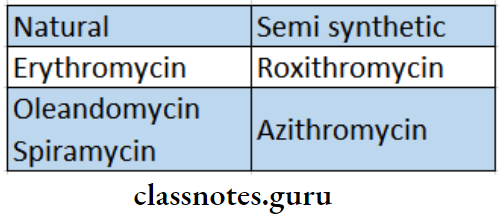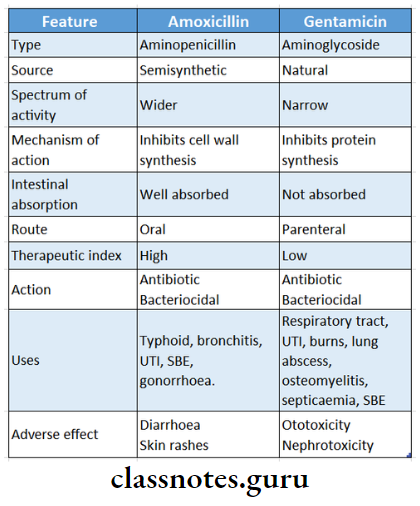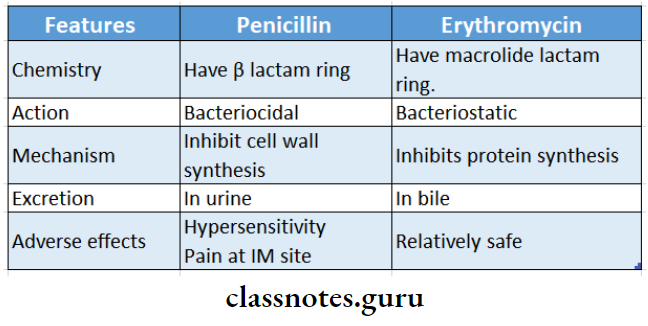Macrolides Important Notes
1. Macrolide Antibiotics
- They have large lactone ring
- They are used as an alternative to penicillin
Macrolides Classification:

Macrolide antibiotics questions and answers
2. Macrolides Erythromycin
- Given in patients allergic to penicillin
- Effective against all penicillin-sensitive organisms and penicillin-resistant streptococci
- Inactivated by gastric acid
- Thus available in enteric-coated tablets
- It is bacteriostatic at low concentrations and bacteriocidal at high concentrations
Read And Learn More: Pharmacology Question and Answers
Macrolide Antibiotics
Macrolides Long Essays
Question 1. Enumerate macrolide antibiotics. Describe the antimicrobial spectrum and therapeutic uses of erythromycin.
Answer:
Macrolide antibiotics:
- These are antibiotics having a macrocyclic lactone ring with attached sugars.
- They are
- Erythromycin.
- Roxithromycin.
- Clarithromycin.
- Azithromycin.
Erythromycin:
It is isolated from streptomyces erythroid.
Macrolide Antibiotics
Erythromycin Antibacterial spectrum:
- Erythromycin has a narrow spectrum.
- It is effective against aerobic gram-positive bacteria and a few gram-negative organisms.
- Streptococci, pneumococci, staphylococci, gonococci, C.diptheria, B. Pertussis, and some atypical mycobacteria.
Macrolides pharmacology MCQs
Erythromycin Uses:
1. Orodental infections
- Used in the prevention and treatment of oriental infections including post-extraction infections, periapical abscesses, and other periodontal lesions.
- Used in patients who are allergic to penicillin.
2. Medical use
- Atypical pneumonia.
- Erythromycin – 500 mg 6 hourly oral or IV is used.
- Legionnaire’s pneumonia.
- Treated for 10 – 14 days with erythromycin.
- Whooping cough.
- Streptococcal infections like pharyngitis tonsillitis and scarlet fever.
- Staphylococcal infections.
- Diptheria.
- Syphilis and gonorrhea.
- Tetanus, anthrax.
3. Topical use
- Ointment – for skin infections and boils.
- Lotions – for acne vulgaris.
4. Prophylactic use
- In valvular heart disease patients.
- For rheumatic fever.
Erythromycin Adverse effects:
1. Gastrointestinal disturbances
- Erythromycin induces gastric contractions, hastens gastric emptying, and promotes intestinal motility.
- Causes epigastric pain.
- Rarely diarrhea occurs.
Macrolide Antibiotics
2. Hepatitis with cholestatic jaundice
- Starts after 2-3 weeks of treatment
- Symptoms are Nausea, vomiting, abdominal cramps, and mimic acute cholecystitis.
3. Hypersensitivity reactions
Fever, skin rashes.
4. Cardiac arrhythmias in patients with cardiac disease.
5. Reversible hearing impairment
Macrolides Short Essays
Question 1. Difference between amoxicillin and gentamicin.
Answer:

Macrolides uses and side effects
Macrolides Short Question And Answers
Question 1. Compare penicillin and erythromycin.
Answer:

Question 2. Macrolide antibiotics.
Answer:
Macrolides are antibiotics with a macrocyclic lactone ring to which sugars are attached.
Macrolide Antibiotics
They are:
- Erythromycin.
- Roxithromycin.
- Clarithromycin.
- Azithromycin.
They are bacteriostatic at low concentrations and bacteriocidal at high concentrations.
Macrolide antibiotics Mechanism:

Erythromycin pharmacology questions
Macrolides Short Question And Answer
Question 1. Azithromycin
Answer:
- It is a derivative of erythromycin
- It is acid stable
- Rapidly absorbed, absorption is decreased by food
- Has better tissue permeability
- Longer-acting
- Better tolerated
- Plasma half-life – 3 days
- Free of drug interactions
- Azithromycin Uses
- Prophylactic use
- Treatment of atypical mycobacterial infections in AIDS patients
- Respiratory infections
- Genital and skin infections
- Pneumonias
- Orodental infection instead of erythromycin
- Acute exacerbation of chronic bronchitis
- Azithromycin Adverse effects
- Mild gastric upset
- Abdominal pain
- Headache
- Dizziness
